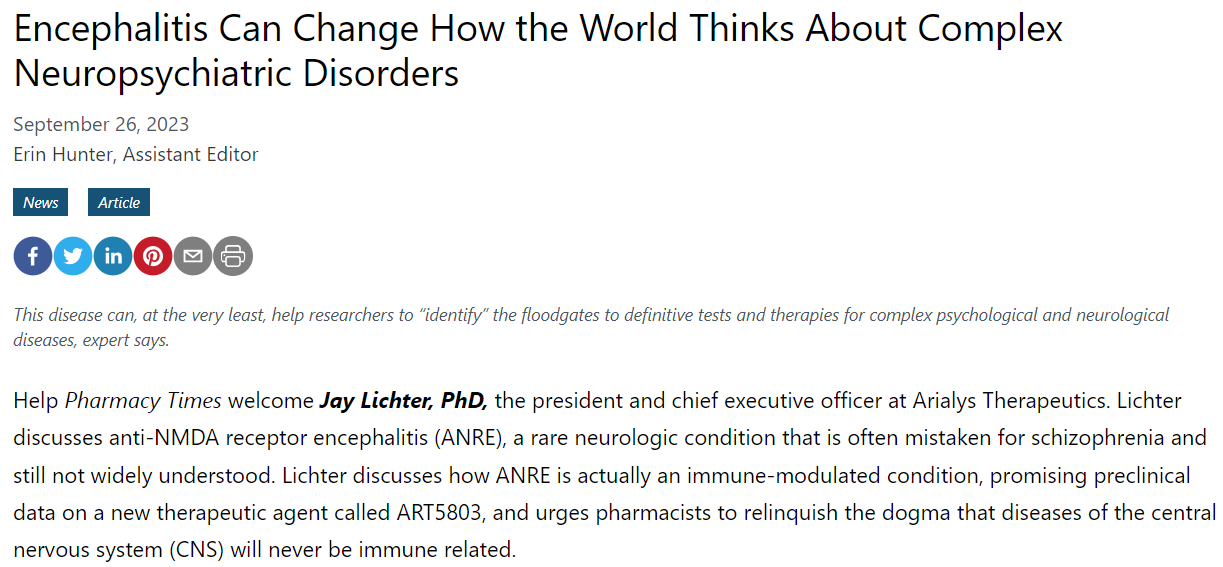
In addition to the articles below, you may benefit from registering for publications and trials related to brain injury. These are two that we find reliable:
- The National Institute for Neurological Disorders and Stroke (NINDS) provides information on treatment, prognosis, and clinical trials for Traumatic Brain Injury (TBI), among other information.
- Brain and Life is a publication that features many neurological disorders, including occasional articles on encephalitis.
From Pharmacy Times, August 26, 2023
www.pharmacytimes.com/view/encephalitis-can-change-how-the-world-thinks-about-complex-neuropsychiatric-disorders
Experts by Experience – A compilation of patients’ stories
Compiled by Brian Loew, Co-founder and CEO of Inspire. Includes a story from Encephalitis411 Board President Becky Dennis.
A special report by Inspire, developed in cooperation with the Stanford University School of Medicine In early 2012, Inspire partnered with the Stanford University School of Medicine to provide a monthly column for the Scope medical blog. This report, Experts by Experience, is made up of a year’s worth of columns from patients of all types and backgrounds. An underpinning of all the columns is the desire by patients for their doctors to truly hear them, and consider them a partner in the care process. Many patients want to share their stories, to help themselves and others. As Laura Haywood-Cory, a woman with a rare heart disorder, said, “As patients, we need to not expect perfection from our doctors until we achieve it in ourselves. And doctors need to give themselves permission to not know everything and to not feel threatened by empowered, educated patients.”
https://www.inspire.com/static/inspire/reports/inspire-stanford-experts-by-experience-report.pdf
Herpes Simplex Virus-1 Encephalitis in Adults: Pathophysiology, Diagnosis, and Management
Michael J. Bradshaw and Arun Venkatesan
Herpetic infections have plagued humanity for thousands of years, but only recently have advances in antiviral medications and supportive treatments equipped physicians to combat the most severe manifestations of disease. Prompt recognition and treatment can be life-saving in the care of patients with herpes simplex-1 virus encephalitis, the most commonly identified cause of sporadic encephalitis worldwide. Clinicians should be able to recognize the clinical signs and symptoms of the infection and familiarize themselves with a rational diagnostic approach and therapeutic modalities, as early recognition and treatment are key to improving outcomes.
https://www.ncbi.nlm.nih.gov/pmc/articles/PMC4965403
Case Definitions, Diagnostic Algorithms, and Priorities in Encephalitis
A. Venkatesan, A. R. Tunkel, K. C. Bloch, A. S. Lauring, J. Sejvar, A. Bitnun, J-P. Stahl, A. Mailles, M. Drebot, C. E. Rupprecht, J. Yoder, J. R. Cope, M. R. Wilson, R. J. Whitley, J. Sullivan, J. Granerod, C. Jones, K. Eastwood, K. N. Ward, D. N. Durrheim, M. V. Solbrig, L. Guo-Dong, and C. A. Glaser; on behalf of the International Encephalitis Consortium
Background. Encephalitis continues to result in substantial morbidity and mortality worldwide. Advances in diagnosis and management have been limited, in part, by a lack of consensus on case definitions, standardized diagnostic approaches, and priorities for research.
Methods. In March 2012, the International Encephalitis Consortium, a committee begun in 2010 with members worldwide, held a meeting in Atlanta to discuss recent advances in encephalitis and to set priorities for future study.
Results. We present a consensus document that proposes a standardized case definition and diagnostic guidelines for evaluation of adults and children with suspected encephalitis. In addition, areas of research priority, including host genetics and selected emerging infections, are discussed.
Conclusions. We anticipate that this document, representing a synthesis of our discussions and supported by literature, will serve as a practical aid to clinicians evaluating patients with suspected encephalitis and will identify key areas and approaches to advance our knowledge of encephalitis.
Case Definitions, Diagnostic Algorithms, and Priorities in Encephalitis
Burden of encephalitis-associated hospitalizations in the United States 1998-2010
Objective: To estimate the burden of encephalitis-associated hospitalizations in the United States for 1998–2010.
Methods: Using the Nationwide Inpatient Sample, a nationally representative database of hospitalizations, estimated numbers and rates of encephalitis-associated hospitalizations for 1998–2010 were calculated. Etiology and outcome of encephalitis-associated hospitalizations were
examined, as well as accompanying diagnoses listed along with encephalitis on the discharge records. Total hospital charges (in 2010 US dollars) were assessed.
https://n.neurology.org/content/82/5/443
The Management of Encephalitis: Clinical Practice Guidelines by the Infectious Diseases Society of America
Allan R. Tunkel, Carol A. Glaser, Karen C. Bloch, James J. Sejvar, Christina M. Marra, Karen L. Roos, Barry J. Hartman, Sheldon L. Kaplan, W. Michael Scheld, and Richard J. Whitley
Guidelines for the diagnosis and treatment of patients with encephalitis were prepared by an Expert Panel of the Infectious Diseases Society of America. The guidelines are intended for use by health care providers who care for patients with encephalitis. The guideline includes data on the epidemiology, clinical features, diagnosis, and treatment of many viral, bacterial, fungal, protozoal, and helminthic etiologies of encephalitis and provides information on when specific etiologic agents should be considered in individual patients with encephalitis.
https://academic.oup.com/cid/article/47/3/303/313455
I’m Not the Me I Remember
Contributions from Encephalitis411 founding board members Becky Dennis and Bob Morris
A special report co-authored by Inspire and Encephalitis Global, Inc., documenting “life after encephalitis.” Inspire provides a number of online communities for people affected by rare diseases, where patients and caregivers reach out to each other. These connections are particularly profound in groups devoted to those affected by rare diseases.
https://www.inspire.com/static/inspire/reports/inspire-encephalitis-global-fighting-encephalitis.pdf
